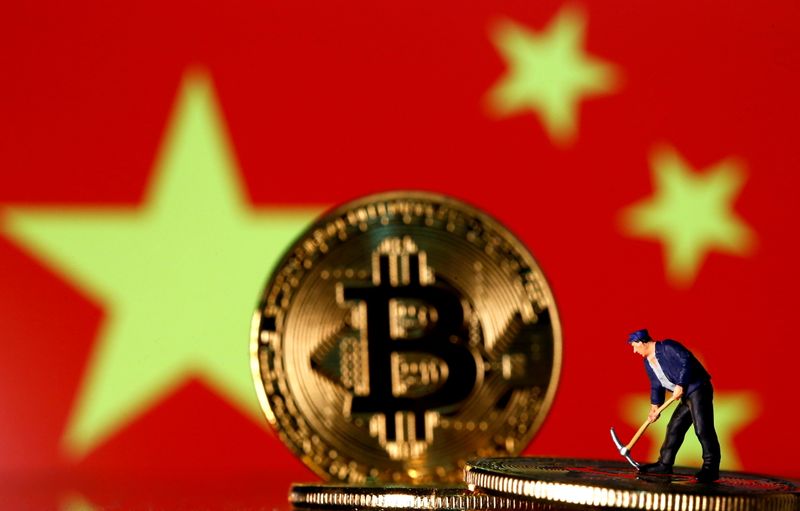SHANGHAI (Reuters) - China's central bank said on Monday it had urged some banks and payment firms to crack down harder on cryptocurrency trading, in the latest move by Chinese authorities to stem the use of digital coins.
The People's Bank of China's statement sent bitcoin tumbling to a two-week low and ether to a more than five-week low. On Tuesday, prices of major cryptocurrencies stabilised.
WHAT DID THE PBOC SAY?
The PBOC statement followed a meeting with banks and payment firms in which it urged them to thoroughly check client accounts, identify those involved in cryptocurrency transactions and promptly cut their payment channels.
China Construction Bank (OTC:CICHF), Industrial and Commercial Bank of China (ICBC), Agricultural Bank of China (OTC:ACGBF) (AgBank) and Postal Savings Bank of China attended the meeting, along with Alipay, the ubiquitous payment platform owned by fintech giant Ant Group.
Attendees vowed to comply. AgBank said that it would conduct due diligence to root out illegal crypto-related activities and shut down suspicious accounts, and Alipay said it would set up a monitoring system targeting key websites and accounts, and blacklist merchants involved in virtual currency transactions.
WHAT IS THE IMPACT OF THE CRACKDOWN?
The latest tightening makes it far more difficult for individuals in China to trade cryptocurrencies, even through channels that have avoided previous restrictions.
"The law hasn't changed, it's just the enforcement," said Bobby Lee, founder and CEO of Ballet, a cryptocurrency wallet app, and formerly CEO of BTC China, China's first bitcoin exchange.
The PBOC statement also effectively cuts off payment channels through which mainland Chinese traders have acquired cryptocurrencies to trade offshore.
"Essentially this puts all the OTC platforms out of business...all the OTC platforms were skirting the last ban, which was to not have exchanges," Lee said.
But banks and payment companies continue to face challenges of identifying money flows related to cryptocurrencies. For now, Beijing has not targeted the holding of digital coins.
"Bitcoin is still at this point a legal digital asset for people to own," said Lee. "So maybe the final nail in the coffin, if it happens in a few years, is they literally declare bitcoin illegal to possess."
HOW HAS CHINA SOUGHT TO REGULATE CRYPTO?
Last month, three industry associations banned crypto-related financial services, and a meeting of the State Council's Financial Stability and Development Committee chaired by Vice Premier Liu He vowed a crackdown on bitcoin mining and trading as part of efforts to fend off financial risks.
Bans on crypto mining have been issued in major bitcoin mining hubs, including Sichuan, Xinjiang, and Inner Mongolia.
China's crypto restrictions date to 2013, when financial regulators banned banks and payment companies from providing bitcoin-related services.
In September 2017, China banned Initial Coin Offerings (ICOs), barred financial firms and payment companies from providing services for ICOs and cryptocurrencies, and banned cryptocurrency trading platforms from converting between legal tender and cryptocurrencies.
The restrictions prompted most such platforms to shut down, with many moving offshore.
WHY HAS CHINA TIGHTENED REGULATION?
This year's bitcoin bull run revived cryptocurrency trading in China, prompting warnings from regulators over financial risks and money laundering.
With local exchanges shut down, many Chinese investors have switched to platforms owned by Chinese exchanges that had relocated overseas, including Huobi and OKEx, or trade over-the-counter through online platforms and social media trading chatrooms.
China-focused exchanges, which also include Binance and MXC, have allowed Chinese individuals to easily open accounts online. They have also facilitated peer-to-peer deals in OTC markets that help convert Chinese yuan into cryptocurrencies. Traders make such transactions through banks or online payment channels such as Alipay or WeChat Pay.
Retail investors have also been able to buy "computing power" from cryptocurrency miners, who design various investment schemes that promise quick and fat returns.
Meanwhile, cryptocurrencies' potential threat to China's fiat currency, the yuan, has spurred the PBOC to launch its own digital currency.
